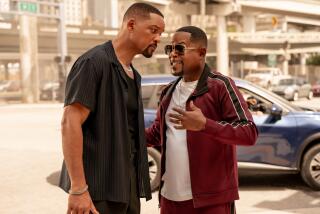Tripped by Its Clumsy Lines
- Share via
To watch the new “Rollerball” is to understand why John McTiernan would be tempted to rework the 1975 Norman Jewison original. The earlier film was set in a future in which an ultra-violent sport served as an outlet for a world in which other violence had been banned. Since the day of extreme sports has arrived--in a world more violent than ever--there was no need to set it in the future.
By setting the story in an unnamed former Soviet republic in central Asia that seems to be Kazakhstan, McTiernan and his writers could comment on how violence and corruption flourish in post-Soviet chaos and at the same time turn out high-voltage action entertainment.
Unfortunately, it didn’t turn out that way.
The central Asian context for the plot was either smudged in the film’s well-publicized reworking or was never defined in the first place. What is clear is that too much of the dialogue is laughably awful, which is a shame because it undercuts the bravura accomplishment in the staging and photographing of the rollerball sequences.
The sport takes place on a figure-eight slope-sided track, and its participants, on skates, attempt to toss small hard balls into a basketball-like hoop. It’s not enough that the competing teams try to block each other, hockey-style: A motorcyclist also keeps whizzing by--sometimes overhead. It wouldn’t have hurt to have had a simple explanation of how rollerball works, enabling the viewer to get caught up in the not inconsiderable visceral thrill of the sport without having to worry about what exactly is going on--an observation that lamentably applies to the film as a whole.
Rollerball is the invention of a man known only as Petrovich (Jean Reno), a guy so scary behind a hearty, affable facade that it is said that in the old days, KGB colonels crossed streets to avoid him when they saw him coming. With the promise of big bucks and perks like sports cars and beautiful women, Petrovich has attracted players from around the world, among them a pair of likable but reckless San Francisco daredevils, Jon Cross (Chris Klein) and Marcus Ridley (LL Cool J). No sooner has Jon become involved with teammate Aurora (Rebecca Romijn-Stamos), a local girl with a penchant for lifting weights topless, than he realizes that a bloody on-track accident was in fact deliberately set up.
Petrovich has made the crucial discovery that the more blood that’s spilled, the higher TV ratings spike. Petrovich therefore sees his dream of an all-important North American cable deal within his grasp. Meanwhile, outside the stadium, locals are rioting in the streets, apparently protesting the demolition of a tract of affordable housing, a sequence epitomizing the vague, disconnected quality of the entire film.
Jon turns out to be an all-American innocent who, in his stunning naivete, goes with evidence of the on-track sabotage to the avuncular Petrovich, who of course expresses dismay and assures him he will investigate. Reflection is not Jon’s long suit, so it never occurs to him that Petrovich could have ordered the sabotage.
After Aurora, who at least has the smarts to be aghast at Jon’s lack of perception, clues him in about Petrovich, the situation worsens. There is more on-track sabotage and more poking about by Jon, which naturally does not go unobserved by Petrovich. Ultimately Jon and Marcus realize they have become virtual gladiators and must escape the country if they are to save their lives.
A film that worked on several levels could have emerged from the basic plot had it been fully developed with sharply drawn characters. The film’s stars are well cast and make good impressions, but their roles lack dimension.
Reno is a wonderful actor with tremendous presence, but the weighty combination of his thick French accent and trite dialogue reduces him much of the time to no more than a standard melodrama villain. “Rollerball” has smart high-tech production and costume design, and roars along at a fortunately breakneck pace, accompanied by a growling, hard-driving score.
The film’s major accomplishment, no small matter, is Steve Mason’s camera work, which places us smack in the midst of the on-track action. A tip of the hat is also in order to stunt coordinator Jamie Jones and his large and expert teams of stunt performers and skaters.
It’s too bad this “Rollerball” veered off-track so swiftly, derailed by bad writing and possibly also by some of that extensive post-production reworking to aim the film at young males in the throes of their first full flush of testosterone.
*
MPAA rating: PG-13, for violence, extreme sports action, language and some drug references. Times guidelines: Some fairly brutal action; too intense for young audiences.
‘Rollerball’
Chris Klein...Jon
Jean Reno... Petrovich
LL Cool J...Marcus Ridley
Rebecca Romijn-Stamos...Aurora
An MGM presentation in association with the Mosaic Media Group. Director John McTiernan. Producers Charles Roven, Beau St. Clair, John McTiernan. Executive producer Michael Tadross. Screenplay by Larry Ferguson and John Pogue; based on the short story and screenplay by William Harrison. Cinematographer Steve Mason. Editor John Wright. Music Eric Serra. Costumes Kate Harrington. Visual effects supervisor John Sullivan. Stunt coordinator Jamie Jones. Production designer Norman Garwood, assisted by Dennis Bradford. Art director Helen Jarvis. Set decorator Hilton Rosemarin. Running time: 1 hour, 43 minutes.
In general release.
More to Read
Only good movies
Get the Indie Focus newsletter, Mark Olsen's weekly guide to the world of cinema.
You may occasionally receive promotional content from the Los Angeles Times.









